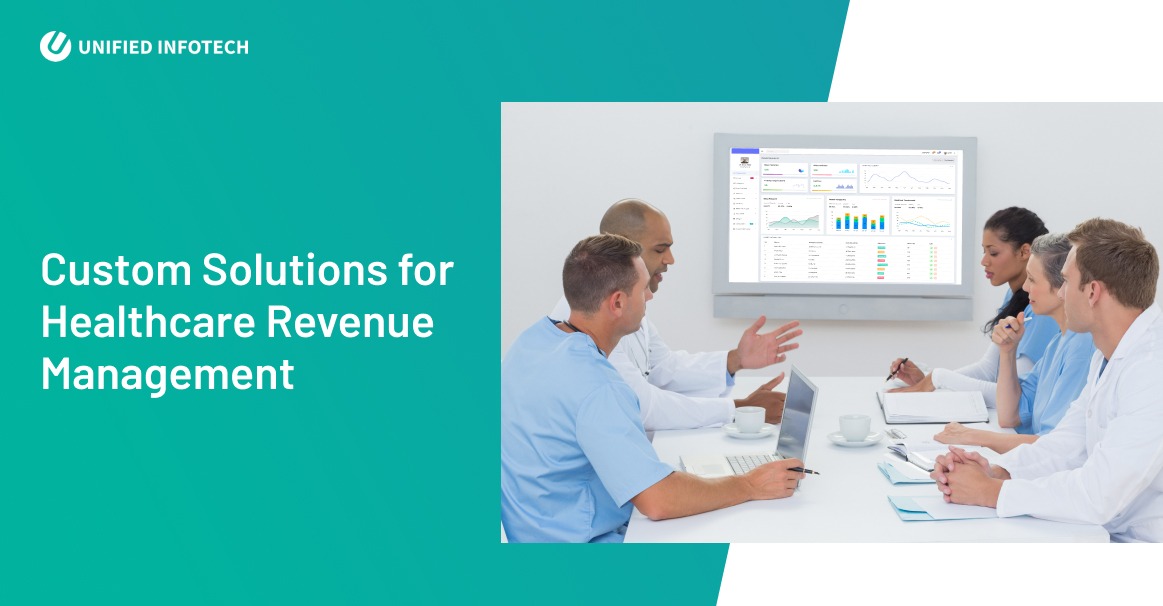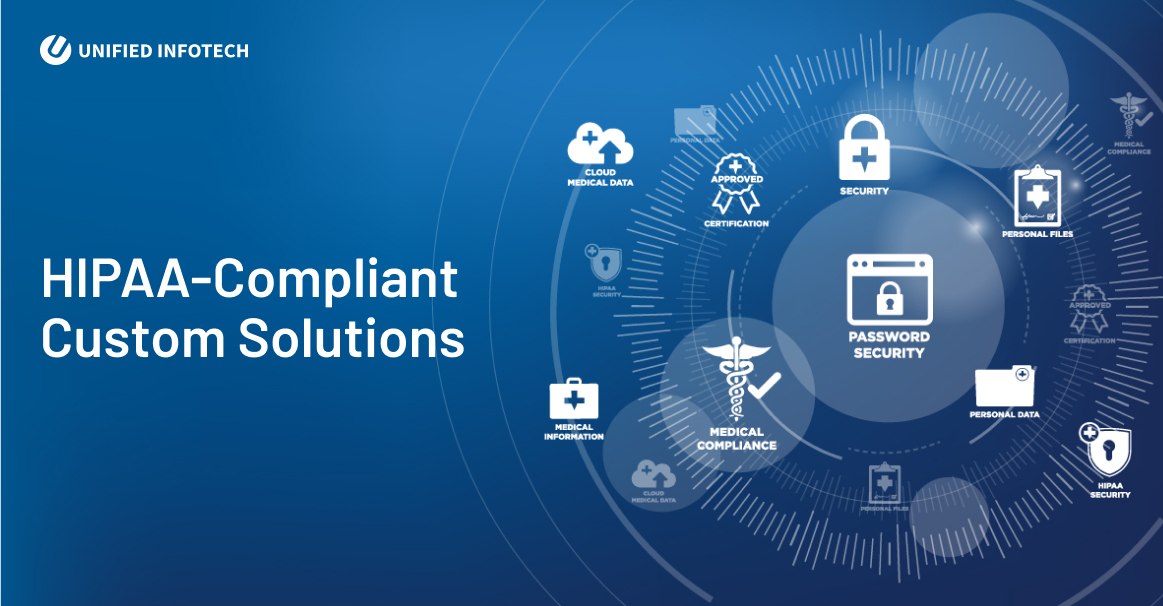
Site Search
An In-depth Guide on Healthcare Software Development in 2024
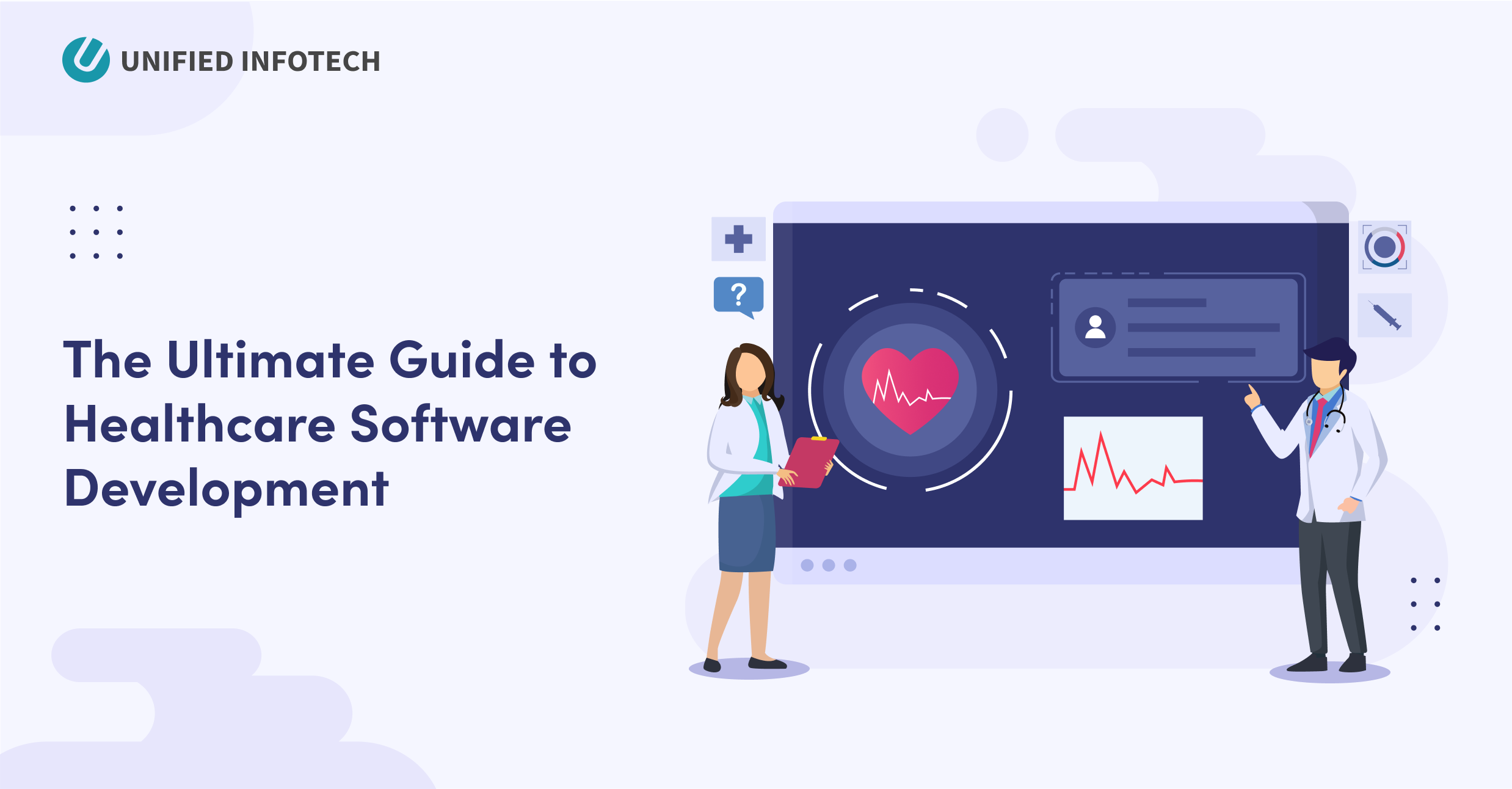
Table of contents

Let's talk
Reach out, we'd love to hear from you!
As the new year unfolds, technological innovations continue to play a major role in reshaping the healthcare industry. The rapidly evolving healthcare software development sector is not just redefining medical practices but also transforming patient experiences.
The global healthcare IT market is expected to reach $974.5 billion by 2027 and this astounding growth is largely attributed to the demand for healthcare solutions that reduce costs, improve patient care, and enhance process efficiency.
Whether you are a professional seeking to streamline healthcare operations or an organization aiming to invest in solutions that digitally transform the healthcare sector, you are in the right place. So, consider this essential guide to delve deep into healthcare software development, showcasing how we approach the process and making predictions about the future of developing medical software.

What is Healthcare Software Development
Healthcare software development, also popularly called medical software development, is a technology-driven process of developing digital solutions and applications that work towards improving access to healthcare, streamlining the processes, and protecting your data from compromise or loss.

What roles do these medical software play in healthcare
Hospitals are expanding their operations each year. They are now transitioning to customized medical software for easy maintenance and operation of costly assets. Moreover, the healthcare facilities can optimize inventory stocking and minimize operational costs through cutting-edge healthcare IT solutions.
As a matter of fact, features like immediate access to treatment records and medical annals are essential to make sure patients are happy. Tools like automated scheduling and integrated communication networks, along with in-app notifications and messaging, make for a fast and efficient process – perfect for customer satisfaction!
Doctors can also remotely monitor their patients using healthcare software. The patients can quickly consult and get themselves diagnosed without attending the doctor’s office.
Types of Healthcare Solutions We Develop
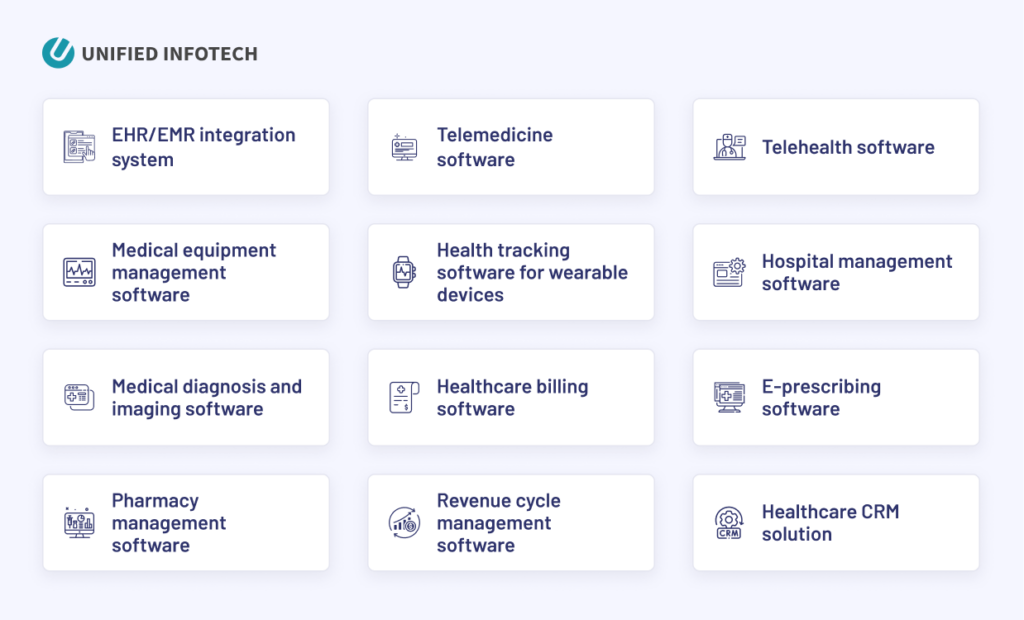
Get an edge over your competitors by making your product an essential element of the healthcare ecosystem through our 365° healthcare software development services. Our healthcare software developers have experience in working with pharmaceutical companies and other healthcare organizations, making custom software development easy. We offer the following types of software to assist you in your unique business needs.
EHR/EMR integration system:
Electronic health records or electronic medical records store medical information of patients digitally. These are used by healthcare facilities and usually integrated with hospital management systems.
Telemedicine software:
It helps doctors and other medical professionals to diagnose or examine patients from a remote setting via file-sharing or video conferencing tools.
Telehealth software:
This type of software is quite similar to telemedicine software except that it can be used for a wider range of medical services, including preventive care, medical staff training, etc.
Medical equipment management software:
It helps in making equipment maintenance easier by automating inventory tracking and proper timetabling of routine maintenance work.
Health tracking software for wearable devices:
These healthcare software applications are suitable for wearable technology and help collect data like body temperature, blood sugar, pulse rate, sleep quality, etc.
Hospital management software:
An HMS delivers management capabilities to the healthcare professionals, patients, and hospital administration. It consists of two panels – one that enhances patient experience and the second one that boosts administration-oriented capabilities.
Medical diagnosis and imaging software:
This kind of software makes appointment scheduling, patient diagnosis, report tracking, and invoicing easier. It is used in radiology departments for enhancing the speed and accuracy of diagnosis.
Healthcare billing software:
It is used by healthcare organizations for automating and streamlining the billing process, which usually include billing to the patient parties and insurance provider.
E-prescribing software:
E-prescriptions aid both doctors and patients, as it simplifies the process of granting, renewing, or changing a prescription.
Pharmacy management software:
The software solution helps optimize controlling and monitoring of drug inventory, improving the pharmaceutical product flow. Moreover, it makes pricing management and customer’s insurance claims processing simpler.
Revenue cycle management software:
The RCM software automates manual tasks, including billing and collection, speeding up and improving the efficiency of the payment process.
Healthcare CRM solution:
The objective of this software type is to maintain better client relationships through improved contact management, care quality, and performance reports.
Who can Benefit from Our Healthcare Software Development Services
Our growing community of satisfied customers that have experienced transformative healthcare solutions include:
- Healthcare providers
- Healthcare software startups
- Healthcare product companies
- Medical device manufacturers
- Pharmaceutical and biotech companies
- Medical research centers
Technology Trends Paving the Way for the Future of Healthcare Software Development in 2024
The future of healthcare development holds immense potential for technological innovations and trends. Several key areas that are expected to craft the landscape of medical software development include
Integration of AI and ML in Healthcare Software
It will facilitate healthcare professionals in making more accurate diagnosis and giving them an upper hand in personalizing treatment plans.
Increasing Popularity of Wearable Technology
The consistent rise in demand for integration of IoT and wearable technology in healthcare solutions will be the driving factor behind remote patient monitoring, which will help medical practitioners to gather real-time data and make informed decisions.
Inclusion of Blockchain Technology
It is expected that blockchain technology will play a major role in safeguarding healthcare data, reducing the risks of unauthorized access and breaches. Specifically, blockchain can help democratize and decentralize healthcare information.
Cross-Platform Compatibility
Interoperability and cross-platform compatibility will seek to break down silos and facilitate exchange of data, protecting individual privacy across the healthcare landscape.
Our Approach to Healthcare Software Development
We follow the Agile methodology of healthcare software development to create robust, user-centric applications that provide unmatched user convenience and satisfaction.
Step-by-Step Process to Develop Custom Software for the Healthcare Sector
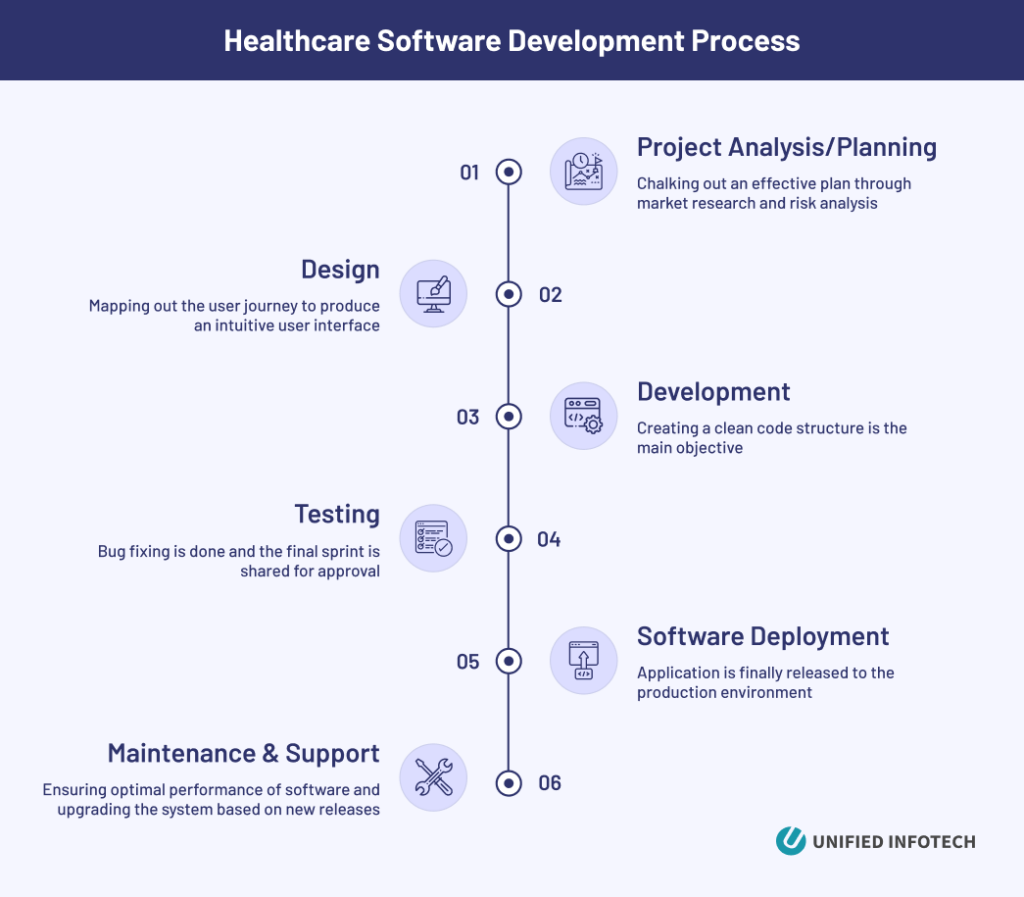
- Project Analysis/Planning
Our team understands the project scope and chalks out an effective plan through IT consulting. The experienced professionals at Unified Infotech perform thorough market research, analyze the potential risks, and create a mitigation plan before starting your project.
- Design
Our UI/UX experts map out the user journeys to produce an intuitive and attractive user interface, which includes graphic components that will help the end users interact with your software.
- Development
This stage involves development of the frontend and backend, as well as integration of third-party APIs. We maintain the gold standards in healthcare development practices, keeping all the applicable industry compliances in mind.
- Testing
Our QA engineers conduct healthcare software testing, which generally includes functional, vulnerability, integration, performance, accessibility, and usability testing. The comprehensive testing and validation process eliminates bugs and ensures seamless software functioning.
- Software Deployment
Once the testing phase has been completed, our healthcare developers finally release the application to the production environment.
- Maintenance and Support
A crucial aspect of maintaining the optimal performance of your healthcare software is the regular implementation of security and functional upgrades. We ensure seamless performance of the application, which is pivotal in today’s digitally driven healthcare landscape.

Why Choose Us for Custom Healthcare Software Development
We are a boutique medical software development company with expertise in building custom solutions tailored to your specific business needs. Stay ahead of the curve with our 360° healthcare software development services.
Rapid Software Release
We make sure that MVP deployment and every sprint release are on time and in accordance with CI/CD and DevOps best practices.
Reliable and Secure Development
At Unified Infotech, we have a software development team with hands-on experience in building secure medical applications, ensuring strict compliance with healthcare regulations.
Flexible Engagement Models
Our flexible engagement models are designed to meet your needs, driving outstanding performance and ensuring optimal results for your software solution.
Seamless Integration with Medical Devices
We ensure that the software we develop is user-centric and easy to integrate with medical devices through WiFi, Bluetooth, 5G, etc.
Agile and Transparent Methodology
Backed by the Agile approach, our software development process is completely lucid and easily understandable. Each developmental stage can be reviewed, and you can give your feedback in real-time.


